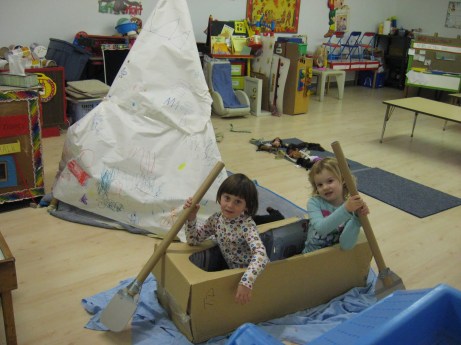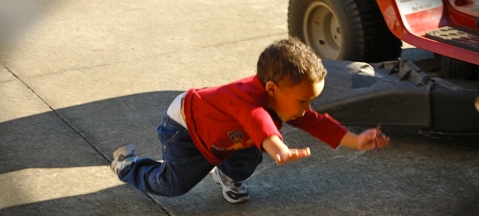
Happy, learning children
Image from http://www.cumc.com
#Empowerment for Children
In Empowerment for Teens, we saw that the way children are raised has a huge effect on their behaviour as teens and then young adults. This is found in the most basic of human instincts, the instinct of survival, one of the few a baby is born with, and is very relevant in Empowerment for Children
To survive, a human being is programmed to do whatever it must. As a baby has little conscious thought capability at birth, everything is trial, error and instinct. Babies rely on mothers for feeding, nurturing, protection and survival. Therefore keeping mother close is a survival instinct. To do this, some babies cry, some laugh, some are cute and coy, some are funny little clowns. All are survival strategies initially; the range of survival strategies expands as the baby grows.
A toddler cry baby doesn’t get much sympathy. However, the baby can learn that a certain laugh, or a certain funny behaviour can get mother’s attention, so that becomes a strategy. This might be the start of the ‘clown’ survival strategy. Robin Williams claims this was his way of surviving school, where the bigger boys bullied him until he told jokes! Now, it is his career!
With most young animals in a nest, if there is competition for food, the bully always wins. The same with human babies – the instinct is to get in first and get the food to survive. A bigger or more boisterous baby may become a bully as a survival strategy amongst smaller siblings. A smaller one may realise that direct action against a bully would not work, but being sneaky and agile might – monkey like antics might become the survival strategy, or outright stealth, guile and theft. Just as a survival strategy.

Feeding time – who’s going to get it?
Image from commons.wikimedia.org
However, we see these same strategies employed in adults! This is because these survival strategies become embedded as “sub-personalities” in the mind and psyche of the child and remain embedded as the child grows up. At one time they were all relevant as survival strategies; now, as adults many are redundant, but they remain.
How are sub-personalities relevant to empowerment for children?
The baby we first looked at is developing sub-personalities as it grows older, in order to survive. The empowered child, the well balanced and happy child will confidently move between sub-personalities almost unconsciously, provided we create and foster a supportive environment around them, making it safe for them to grow, explore and experience the world.
How do we make empowerment for children possible?
As parents, it is our responsibility to create the most supportive environment for our children to grow up in. The best way to do that is for us to be fully empowered personally first – being the best parents and teachers we can be, for them to model as they grow. Empowerment for Children comes after their parents learn empowerment for women and empowerment for men!
Children do not do as they are taught. Children do as they are shown by example and that is why they model older children, rather than anonymous characters from text books! As parents, we need to demonstrate what we want children to learn, and provide the environment where this learning is possible!
Enlightened educationalists will tell us that children learn best in a happy environment where they can experience what they are learning about. Experiential learning has become a buzz word but really, children have been doing it for thousands of generations, learning through their childhood games. We need to ensure those childhood games are possible, safe and that we can participate in them to the extent we need to, so that we can give guidance as and when the children need it.

Learning by playing
Image from lindaoconnell.blogspot.com
The best way for empowerment for children to be experienced is by parents reading to children. If you have ever seen the rapt look on a child’s face as they explore a picture book with Mummy or Daddy, and the innocent questions that come from it, you will understand. As the child grows, reading more mature story books opens the child’s mind to the wider world. I remember my Dad reading “Treasure Island” to me, and another of our favourites, “Two years on Bardunyah Station”, an Australian outback cattle station where everything was larger than life. Stories such as these allowed us to create magical images of what lay beyond and enthused us with the desire to get out and explore the world, to discover our own Treasure Islands and feel the vastness of the wide outdoors. We were fortunate that we had empowered parents who understood this.

Reading to your child is empowering for them
edu101.hubpages.com
When the children do get outdoors, be there with them! Children’s school sports days are a great place for them to show off to Mum and Dad, if they are sporting by nature. Music recitals or dance classes are other great ways to participate in your children’s activities if they have come to love the arts. Whether or not they are the best doesn’t matter, as long as you demonstrate your involvement, and show encouragement for their efforts!

School sports day
http://www.chengelo.sch.zm
Is it OK for a child to fail?
Empowerment for Children can only happen when the child learns to fall over and stand up to try again! So many are nursed through childhood that when they reach teens and Mum and Dad can’t keep an eye on them every waking moment, that the first obstacle they come across flummoxes them! They need to learn from setbacks; learn to power on despite them and because of them, learning from the mistakes and picking up the lessons! Only in this way do they become ‘battle hardened’ for the sometimes hostile environments they will face as teens and young adults.

Ooops! Here comes a lesson!
Image from liketreesplanted.com
However, of critical importance is where Mummy and Daddy are when they fall, and how THEY react to their child’s failures! Empowerment for children happens when they learn from parents that it’s not the failure that matters, it’s getting the lesson and starting over that is important! If parents are critical of poor school results, poor sporting results or music recitals, then the child learns that it’s a hard world and their parents are just another part of it. If instead Parents are there to encourage and teach success habits, they learn that mistakes and failings are only stepping stones to success! They learn what we demonstrate!
This is important in another way too, because as parents we fail sometimes too, and our children know it! They recognise in us the mistakes we make, and if we judge them harshly for their mistakes, that is what they have learned to do with us. They become the most critical and unforgiving teenagers unless they learn the truth about mistakes – they are just part of the lifelong education system we are all enrolled in!
Empowerment for our children is directly proportional to the amount of personal empowerment we, as adult parents have. When WE are empowered, we can empower others, especially our children. Personal development and empowerment work for us is how we can best empower our children, and lead by example on their march into their teens and adulthood.
If you feel this post has contributed to empowerment for children, please share and reblog amongst your friends and associates. So many parents are crying out for empowerment for children, but don’t realise that it is within reach. Your sharing may change the life of another – everyone deserves personal empowerment and this could be the day you make a difference!
Til next time, fair winds and full sails,
Ray Jamieson
Please also refer to my other posts on Empowerment:
